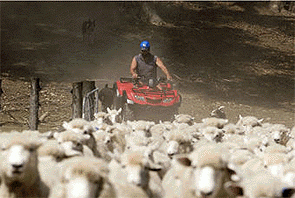
By Donald Aubrey of Federated Farmers
While everyone knows an All Terrain Vehicle (ATV) by its popular 'quad bike' moniker, farmers know these aren’t toys. In the hands of the untrained or the over confident they can be deadly, and ATV safety is far from being an exclusive agricultural problem.
According to ACC, in 2008-09 there were 417 ATV related claims. Of these, 51 were road accidents, 207 were ‘non work or other’ while 159 were ‘work related’. In other words, work related ATV incidents represented 38% of all ACC claims.
The entire agricultural sector knows it needs to do better but perspective is also needed. In 2009, the ‘home toll’ - people accidentally killed in their own home - registered 621 deaths according to ACC, more than 50% higher than the corresponding road toll. While 18,600 people were injured in farm related accidents in 2009, or one person every 34 minutes, 632,920 people were injured in their home – one every 54 seconds. No one is calling for a ‘Warrant of Bathrooms’ but I fear it’s probably forming in an underemployed policy analyst's mind.
Both Federated Farmers and the Agriculture Health and Safety Council stress that education is the solution, aided by technology. Farmers know they have a strict duty of care, rammed home by successful health and safety in employment prosecutions. We have to ensure any ATV user is trained or proficient in their operation.
While the most dangerous single farm implement is arguably an ATV, they are also horse, utility vehicle and tractor rolled into one. They have become a farmer’s Swiss army knife, explaining why there are upwards of 90,000 about.
Some accidents may be nervously laughed off at the end of the day, followed by a reflective, ‘I was damn lucky’, but for 46 farmers last year it ended in serious injury and for five, it was tragically worse. In response, some people, including Wellington’s Coroner, have called for mandatory Roll Over Protection Systems (ROPS) with harnesses, but Federated Farmers isn’t so sure.
Unlike Australia, farming here poses a greater challenge due to undulating terrain, rocks and stumps. Some of our members have developed after market alternatives, like T-Bars, that may have a safety role to play. Yet almost all commercial users of ATV’s are in agreement that ROPS and harnesses may increase the risk of injury.
As with any motorcycle you have to actively ride an ATV so a harness would make this impossible. One scenario that gives me shivers is an ATV rolling downhill and onto a stump with the user restrained. ROPS also fundamentally changes an ATV’s centre of gravity, making a bad situation worse.
Federated Farmers is looking at warning systems because an Otago University study published last year found ‘that those with a tendency to steer uphill, instead of downhill while traversing a left-facing slope, had the most accidents’.
The study asked if tilt warning systems would reduce accidents, bearing in mind the biggest determinant is human behaviour. No amount of safety training, equipment or procedure will ever overcome bravado.
Also when operating an ATV, you can sometimes become so fixated on a task that you become oblivious to a precarious situation you may be entering. Yet inclinometers and clinometers have been around for centuries and are in everything from a Nintendo Wii to an iPad. Instead of advocating for ROPS and harnesses, which shows a lack of understanding about how ATV’s are used, maybe tilt warning systems could become part of a wider solution.
Federated Farmers has been in contact with an American company which manufactures a warning switch weighing just 85-grams. Connected to a lamp or audible warning alarm, it’s designed to indicate unsafe conditions like a potential rollover. Multiple trip settings can be arranged to indicate caution, before a final alarm near the point of no return – a bit like a car’s reversing sensor.
This device was designed for off-road, in-motion vehicles operating in high vibration or rough terrain. In other words, the environment farmers work in daily. The University of Otago study also found that vibration may disturb a user’s natural sense of balance. Having a warning system that cuts through this would help warn of danger especially in rough terrain.
Yet there needs to be a further examination into recreational accidents that are the majority. As ATVs are a farm implement, it’s untenable for every ATV incident to be classed as a farm accident.
My final message is therefore this: No amount of regulation or overt safety devices will overcome a ‘gung-ho invincibility’ as Otago University found. Instead, cultural change requires on-going education and training. With this, Federated Farmers is on the same page as ACC, Farmsafe and the Department of Labour.
* This opinion piece first appeared in today's New Zealand Herald. Donald Aubrey is Vice-President of Federated Farmers and Chairperson of the Agricultural Health and Safety Council.
We welcome your comments below. If you are not already registered, please register to comment
Remember we welcome robust, respectful and insightful debate. We don't welcome abusive or defamatory comments and will de-register those repeatedly making such comments. Our current comment policy is here.